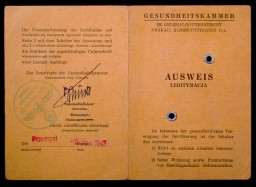You searched for: krakow
<< Previous | Displaying results 26-50 of 152 for "krakow" | Next >>
-
Leah Hammerstein Silverstein describes working under a false non-Jewish identity in a German hospital in Krakow
Oral HistoryLeah grew up in Praga, a suburb of Warsaw, Poland. She was active in the Ha-Shomer ha-Tsa'ir Zionist youth movement. Germany invaded Poland in September 1939. Jews were forced to live in the Warsaw ghetto, which the Germans sealed off in November 1940. In the ghetto, Leah lived with a group of Ha-Shomer ha-Tsa'ir members. In September 1941, she and other members of the youth group escaped from the ghetto to a Ha-Shomer ha-Tsa'ir farm in Zarki, near Czestochowa, Poland. In May 1942, Leah became a courier…
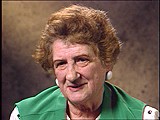
-
Ruth Webber describes the bitterness that she felt after the end of the war when she was in an orphanage in Krakow
Oral HistoryRuth was four years old when the Germans invaded Poland and occupied Ostrowiec. Her family was forced into a ghetto. Germans took over her father's photography business, although he was allowed to continue working outside the ghetto. Before the ghetto was liquidated, Ruth's parents sent her sister into hiding, and managed to get work at a labor camp outside the ghetto. Ruth also went into hiding, either in nearby woods or within the camp itself. When the camp was liquidated, Ruth's parents were split up.…
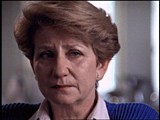
-
Ruth Webber describes the bitterness that she felt after the end of the war when she was in an orphanage in Krakow
Oral HistoryRuth was four years old when the Germans invaded Poland and occupied Ostrowiec. Her family was forced into a ghetto. Germans took over her father's photography business, although he was allowed to continue working outside the ghetto. Before the ghetto was liquidated, Ruth's parents sent her sister into hiding, and managed to get work at a labor camp outside the ghetto. Ruth also went into hiding, either in nearby woods or within the camp itself. When the camp was liquidated, Ruth's parents were split up.…

-
Oskar Schindler
PhotoOskar Schindler (left) at his enamel works in Zablocie, a suburb of Kraków. Poland, 1943-1944.
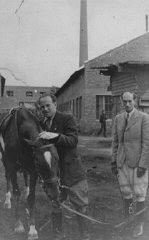
-
A camp commandant on the way to his sentencing
PhotoAmon Goeth (front left), commandant of the Plaszow camp, under escort to the courthouse in Kraków for sentencing. He was sentenced to death at his postwar trial on war crimes charges. Kraków, Poland, August 1946.
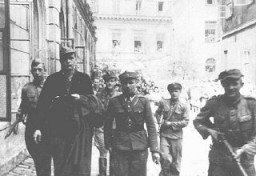
-
Plaszow
ArticleThe Płaszów camp was established in Krakow, Poland, in 1942. Learn more about the camp during the war, including Oskar Schindler’s involvement.
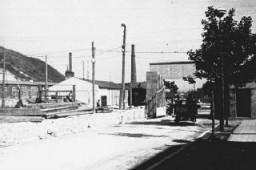
-
Oskar Schindler
ArticleOskar Schindler's actions to protect Jews during the Holocaust saved over 1,000 Jews from deportation. Learn more about Schindler's List.
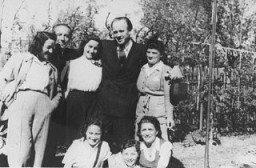
-
Amalie Petranker
ID CardAmalie was one of three daughters born to Jewish parents. The family lived in Stanislav [Stanislawow], Poland. Her father was an ardent supporter of resettlement in Palestine, and dreamed of moving his family there to help build the Jewish homeland. Amalie and her sisters attended private Hebrew primary and secondary schools to help prepare them for their eventual immigration to Palestine. 1933-39: In September 1939 Stanislav [Stanislawow] was occupied by the Soviet army. Amalie's father lost his job in…
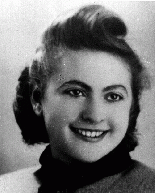
-
My Dream
SongYiddish folk poet and songwriter Mordecai Gebirtig was born in Krakow, Poland, in 1877. In 1940, he was forced to flee from German-occupied Krakow to nearby Lagiewniki. There, in May 1941, he wrote "My Dream"—in which he dreams of peace and revenge. In March 1942 Gebirtig was forced into the Krakow ghetto, where he was killed in June 1942.
-
Moments of Despair
SongYiddish folk poet and songwriter Mordecai Gebirtig was born in Krakow, Poland, in 1877. "Moments of Despair" was written in Krakow in September 1940 on the first anniversary of the German invasion of Poland. The lyrics to this piece comment upon a year of persecution and the uncertainty of the future.
-
Moments of Confidence
SongThis piece was written in Krakow on October 2, 1940. Mordecai Gebirtig wrote this song to raise the spirits of the persecuted Jewish community in Krakow. The poet's reference to "Haman" alludes to the ancient Persian enemy of the Jewish people.
-
Tolling Bells
SongYiddish folk poet and songwriter Mordecai Gebirtig was born in Krakow, Poland, in 1877. In 1940, he was forced to flee from German-occupied Krakow to nearby Lagiewniki. There, in October 1941, he wrote "Tolling Bells"—in which he envisions the end of persecution and occupation.
-
Entrance to Oskar Schindler's enamel works
PhotoView of the entrance to Oskar Schindler's enamel works in Zablocie, a suburb of Krakow. Poland, 1939-1944.
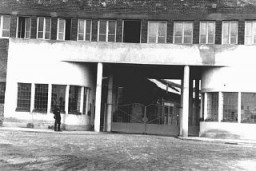
-
Natan Offen
ID CardNatan was one of four children born to religious Jewish parents. They lived in an apartment in Cracow's [Krakow] Podgorze district, a predominantly Jewish area on the southern bank of the Vistula River. Natan's father was a shoemaker until 1936, when he became a dealer in billiards equipment. His mother worked as a dressmaker. Natan and his siblings attended Polish public school. 1933-39: When Natan was 13 he built a crystal radio. Late at night, Natan and his father would listen to stations from all over…

-
Jacob Wasserman
ID CardJacob was the eldest of three sons born to religious Jewish parents in the city of Krakow. His father was a flour merchant. The Wassermans spent summer vacations near Proszowice at a farm owned by their grandfather, who also ran a flour mill. 1933-39: In March 1939, at the age of 13, Jacob celebrated his bar-mitzvah. That summer, his family vacationed as usual at his grandfather's farm. They returned to a nightmare. Krakow had been occupied by the Germans on September 6. Jews were not allowed to walk on…
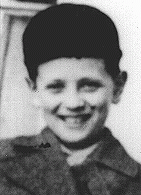
-
Josel Gerszonowicz
ID CardThe oldest of eight children, Josel was born in Miechow, a small town in south central Poland. His father was a machinist and locksmith. As a boy, Josel spent long days learning Hebrew in the Jewish school and taking general subjects at the public school. He was 13 years old when he left school to work in his father's shop. 1933-39: Josel met his wife, Esther, through a matchmaker, and they settled in nearby Dzialoszyce, a town with a Jewish community of about 7,000, and a beautiful synagogue that had…
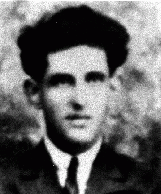
-
Our Springtime
SongMordecai Gebirtig, Yiddish folk poet and songwriter, was born in 1877 in Krakow, Poland. Gebirtig was confined in the Krakow ghetto in March 1942. He wrote "Our Springtime" in April 1942. The lyrics describe the bleakness and despair of ghetto life.
-
A German soldier stands on a toppled Polish monument
PhotoA German soldier stands on a toppled Polish monument. Krakow, Poland, 1940. This statue commemorated the Polish victory at Grunwald over the Teutonic knights in 1410. In accordance with the plans of German occupation authorities in Poland, all physical symbols of Polish national culture were to be obliterated to make way for the "Germanization" of the country.
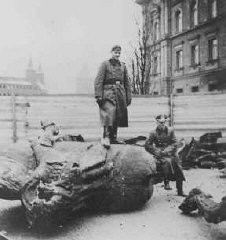
-
Conditions in the Plaszow camp
PhotoPrisoners receive meager food allocations at the Plaszow camp. Krakow, Poland, 1943 or 1944.
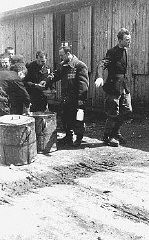
-
Letter Asking for Help to Hide Daughter
Timeline EventFebruary 1, 1943. On this date, Selek and Eda Kuenstler wrote to Sophia Zendler and begged her to hide their child.
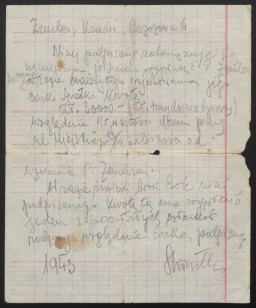
-
Płaszów - Maps
Media EssayThe Płaszów camp was established in 1942 under the authority of the SS and police leaders in Krakow (Cracow). Płaszów was initially a forced-labor camp for Jews, but became a concentration camp in 1944. The largest number of people confined there...
-
Max Diamant's identity card (outside)
DocumentIn July 1942, the German health department located in Krakow (Krakau), occupied Poland, issued this identity card to Max Diamant. This view shows the front and back covers of the card. The interior pages identify Diamant as a dental assistant in Przemysl, Poland, and show his signature and photograph mounted under the stamped word "Jew."
